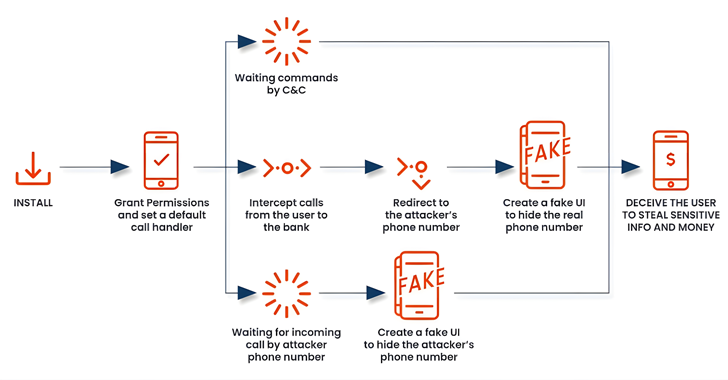Cybersecurity researchers have discovered a new version of a well-known Android malware family dubbed FakeCall that employs voice phishing (aka vishing) techniques to trick users into parting with their personal information.
“FakeCall is an extremely sophisticated Vishing attack that leverages malware to take almost complete control of the mobile device, including the interception of incoming Cybersecurity researchers have discovered a new version of a well-known Android malware family dubbed FakeCall that employs voice phishing (aka vishing) techniques to trick users into parting with their personal information.
“FakeCall is an extremely sophisticated Vishing attack that leverages malware to take almost complete control of the mobile device, including the interception of incoming
- Chinese Hackers Allegedly Pose as US Lawmaker darkreadingAlexander Culafi
- Chinese APT Deploys EggStreme Fileless Malware to Breach Philippine Military Systems The Hacker [email protected] (The Hacker News)
- BASE64 Over DNS, (Wed, Sep 10th) SANS Internet Storm Center, InfoCON: green
- The Quiet Revolution in Kubernetes Security darkreadingNigel Douglas
- CHILLYHELL macOS Backdoor and ZynorRAT RAT Threaten macOS, Windows, and Linux Systems The Hacker [email protected] (The Hacker News)
- The Beginner’s Guide to Using AI: 5 Easy Ways to Get Started (Without Accidentally Summoning Skynet)by Tech Jacks
- Tips and Tricks to Enhance Your Incident Response Proceduresby Tech Jacks
- Building a Security Roadmap for Your Company: Strategic Precision for Modern Enterprises by Tech Jacks
- The Power of Policy: How Creating Strong Standard Operating Procedures Expedites Security Initiativesby Tech Jacks
- Building a Future-Proof SOC: Strategies for CISOs and Infosec Leaders by Tech Jacks
- Security Gate Keeping – Annoying – Unhelpfulby Tech Jacks
- The Beginner’s Guide to Using AI: 5 Easy Ways to Get Started (Without Accidentally Summoning Skynet)



Leave A Reply